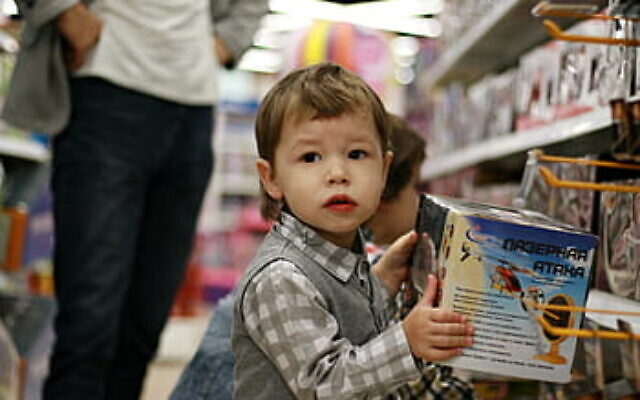Are Kids Overindulged?
Is giving gifts to our children for Chanukah and year-round out of control? We ask community members to weigh in.
Chana Shapiro is an educator, writer, editor and illustrator whose work has appeared in journals, newspapers and magazines. She is a regular contributor to the AJT.

A few years ago, I attended a Chanukah party in which the families agreed not to exchange gifts. After lighting the candles, the host unexpectedly presented a $10 bill to each of the children. The kids thanked him, showing the good manners they’d been taught. But later, I overheard a usually polite and courteous teen complain to some of the other kids, “Only $10! What good is $10?” I wondered what amount of money would have been appreciated.
Clinical psychologist Dr. Sharon Habif is concerned about “the present entitled generation.” She explained, “When young people are overindulged, they’re being deprived of acquiring important life skills, including developing responsibility and building a tolerance for frustration. Older kids should learn to work for things in order to gain a strong work ethic.”
Habif sometimes gives simple “no-occasion gifts,” she said, “just to make someone happy.” She believes that extravagant gifts, including Chanukah presents, are not necessary. “It’s our job as parents to prepare our children for adult life, which they cannot learn through overindulgence.”

Grandmother Rozalia Burmen seldom says “no.” She doesn’t like to wait for items she wants, and she sees no reason for her 16-year-old granddaughter Mim to wait, either. “We have so much fun going online and looking at clothes and accessories and discussing everything we see,” Burmen said. “Sometimes Mim tells me that I buy her too much, but it’s my pleasure! I don’t buy her clothes that I think won’t be flattering or are too ‘grown up.’”
Does this grandmother, who frequently buys gifts, subsequently limit Mim’s Chanukah presents? “Of course not!” she answers, “A girl can never have too many nice clothes.”
Rabbi Mark Kunis of Congregation Shaarei Shamayim notes that “Purim, not Chanukah, is the Jewish holiday for gift-giving, but it’s hard for parents because Chanukah and Christmas fall close to each other.”
Kunis’ family averts the desire to imitate elements of the pervasive Christian celebration by driving around Christmas-decorated neighborhoods. “We teach our children to be happy that we have our holidays and Christians have theirs, and we enjoy their decorations.”
Kunis adds, “In our family, we give children Chanukah gelt, real coins and chocolate ones. We use the real coins to play dreidel and talk about the meaning of the letters nun, gimmel, hey and shin, which stand for ‘A great miracle happened there [Israel].’ We also explain that Israeli dreidels replace the letter shin [which stands for “there”] with the letter pey [which stands for “here] because a great miracle happened in Israel. We all light our own menorahs, most which we made ourselves. Giving a present is fine, but we don’t go too far. We focus on the Chanukah miracles.”

When Gila (not her real name) wanted to buy her second-grade granddaughter Leah a special gift for Chanukah, she asked Leah’s mother – Gila’s daughter – for suggestions. Gila was surprised by the answer: Buy Leah a pair of pink UGGs Bailey Bow boots. Gila candidly responded that they’d get ruined in Connecticut winter weather and it would make more sense to buy Leah a pair of cute all-weather boots. “She’s too young,” Gila explained. “Why does she need boots that cost $150?” Leah’s mother countered, “All the other girls have them, and Leah deserves to have them, too.”
Gila wondered what extraordinary feat her 7-year-old granddaughter had performed to “deserve” such a luxury. “You just don’t get it,” her daughter declared. In the end, Leah’s other set of grandparents purchased the pink Bailey Bow UGGs.
Social worker Sylvia Miller, an Atlanta Jewish Academy school counselor, has learned through research that children who are more indulged become less resilient, less able to cope with life’s difficulties and deal with disappointment. That doesn’t mean children shouldn’t receive gifts, Miller said, but she stresses that young people crave — and have enduring memories of — time with their parents.

Child and adolescent psychiatrist Dr. Eric Fier offers the following insight: “The issue is not truly one of overindulgence; it’s about how we indulge our kids. Our kids need more of our time, more of our active listening, more adventures into creative shared spaces together.
“You don’t ‘spoil’ a child with too much time together experiencing meaningful things. Buying expensive gifts is not a relationship-builder. It’s a token of limited lasting value and significance. Instead, take your child on a one-on-one trip and create opportunities to build a relationship. Convince your child that this is not for them, but for you, as there is nothing you love more than your special time with them. These are the gifts that actually appreciate in value in the form of memories and the loving significance we attach to them,” he continued.
“The diet of screens that our kids are being raised on is enormously and painfully effective at diluting the value of relationships – of meaningful, personal, nuanced interconnectedness. The only antidote I’ve found is time together where we are mindfully present with our children. Through this, we are modeling for our children how they will build relationships with their children. This is, perhaps, the greatest gift we can give them.”



comments